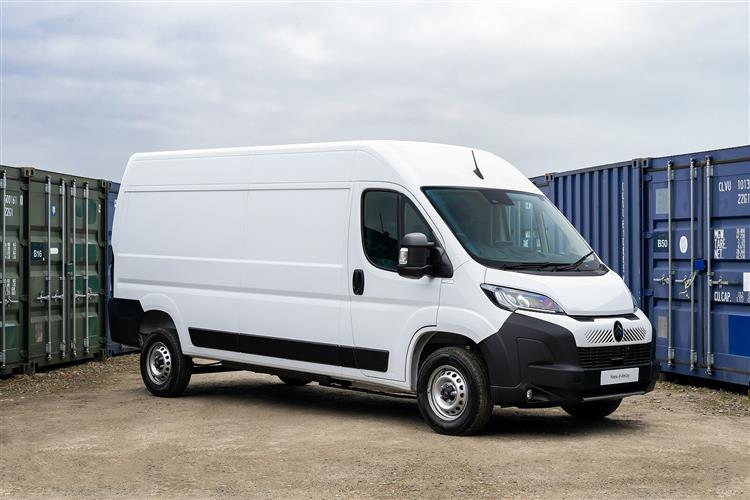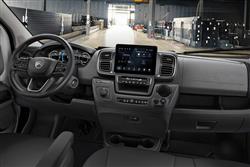RELAY ACE? (some text hidden) --NONE--
By Jonathan Crouch
In this improved form, Citroen's e-Relay will suit a much wider business demographic. Jonathan Crouch drives it.
Ten Second Reviewword count: 80
Citroen has much improved the full-electric version of its largest van, the Relay, with a larger battery, a gutsier electric motor and a bigger 22kW onboard charger. The e-Relay shares its design and drivetrain with four key rivals from Peugeot, Vauxhall, Fiat and Toyota. And now offers the option of a heavier payload, though it still isn't as great as the diesel version. Cargo capacity isn't compromised by the EV installation and charging speeds are relatively fast by class standards.
Backgroundword count: 141
The Stellantis Group has taken its time getting into gear with its large EV van models, all of which first arrived back in 2022, including the original version of the big LCV we look at here, the Citroen e-Relay. It directly shares its design and electric engineering with four other segment rivals, Peugeot's E-Boxer, Vauxhall's Movano Electric, Fiat's E-Ducato and Toyota's Proace Max Electric. The original e-Relay used a Turkish-installed EV drivetrain that left it woefully under-powered and under-endowed with range compared to competitors like Ford's E-Transit, so lots of work has gone into improving this significantly updated version. This now gets a vastly bigger 110kWh battery, which also brings with it a vastly improved level of EV driving range. Plus in this updated form, this now-smarter-looking big EV van can take much heavier loads too. Let's take a closer look.
Driving Experienceword count: 162
The original e-Relay felt a bit feeble for an EV van - but that's all changed now. It now gets a much larger 110kWh battery (to replace the previous 37kWh and 70kWh battery options); and that new battery pack energises a much more powerful 270PS motor (up from 122PS before). As a result, pulling power rises from 260 to 410Nm. The performance and range of the e-Relay can be optimised depending on conditions thanks to three driving modes, and features paddles located just behind the steering wheel that activate four levels of regenerative deceleration, thus enhancing range - now rated at between 235 and 262 miles (up from 154 miles in the old 75kWh model). The steering's quite a old-fashioned set-up that's quite heavy at low speeds, but lightens up at faster ones. Whatever e-Relay variant you select, around town, this van can make light work of tricky urban situations; the 'L3H2' variant offers a relatively tight 14.14m turning circle between kerbs.
To see the full road test text contact us on 0330 0020 227
Pictures (high res disabled)

.jpg)
|
.jpg)
|
.jpg)
| |||
.jpg)
|
.jpg)
|
.jpg)
| |||

|
Statistics (subset of data only)
Min |
Max |
|
Price: |
£45,959.00 (At 28 Aug 2025, 35 L3H2 ex VAT but including PiVG grant) |
£48,215.00 (At 28 Aug 2025, 40 L4H3 ex VAT but including PiVG grant) |
Electric WLTP-Rated Driving Range (miles): |
235 |
|
Length (mm): |
4035 |
|
Height (mm): |
2522 |
|
Load Volume (l): |
13 |
17 |
Payload Capacity (l): |
710 |
1460 |
Power (ps): |
270 |
|
Scoring (subset of scores)
Category: Vans
| Performance | |
| Handling | |
| Comfort | |
| Space | |
| Styling, Build, Value, Equipment, Depreciation, Handling, Insurance and Total scores are available with our full data feed. | |



